Part One
The wind was a torrent of darkness among the gusty trees,
The moon was a ghostly galleon tossed upon cloudy seas,
The road was a ribbon of moonlight, over the purple moor,
And the highwayman came riding-
He'd a French cocked-hat on his forehead, a bunch of lace at his chin,
A coat of the claret velvet, and breeches of brown doe-skin;
They fitted with never a wrinkle: his boots were up to the thigh!
And he rode with a jewelled twinkle,
Over the cobbles he clattered and clashed in the dark inn-yard,
And he tapped with his whip on the shutters, but all was locked and barred;
He whistled a tune to the window, and who should be waiting there
But the landlord's black-eyed daughter,
And dark in the old inn-yard a stable-wicket creaked
Where Tim the ostler listened; his face was white and peaked;
His eyes were hollows of madness, his hair like mouldy hay,
But he loved the landlord's daughter,
"One kiss, my bonny sweetheart, I'm after a prize to-night,
But I shall be back with the yellow gold before the morning light;
Yet, if they press me sharply, and harry me through the day,
Then look for me by moonlight,
He rose upright in the stirrups; he scarce could reach her hand,
But she loosened her hair i' the casement! His face burnt like a brand
As the black cascade of perfume came tumbling over his breast;
And he kissed its waves in the moonlight,
Part Two
He did not come in the dawning; he did not come at noon;
And out o' the tawny sunset, before the rise o' the moon,
When the road was a gipsy's ribbon, looping the purple moor,
A red-coat troop came marching-
They said no word to the landlord, they drank his ale instead,
But they gagged his daughter and bound her to the foot of her narrow bed;
Two of them knelt at her casement, with muskets at their side!
There was death at every window;
They had tied her up to attention, with many a sniggering jest;
They bound a musket beside her, with the barrel beneath her breast!
"Now keep good watch!" and they kissed her. She heard the dead man say-
Look for me by moonlight;
She twisted her hands behind her; but all the knots held good!
She writhed her hands till here fingers were wet with sweat or blood!
They stretched and strained in the darkness, and the hours crawled by like years,
Till, now, on the stroke of midnight,
The tip of one finger touched it; she strove no more for the rest!
Up, she stood up to attention, with the barrel beneath her breast,
She would not risk their hearing; she would not strive again;
For the road lay bare in the moonlight;
Tlot-tlot; tlot-tlot! Had they heard it? The horse-hoofs
ringing clear;
Tlot-tlot, tlot-tlot, in the distance? Were they deaf that they did not hear?
Down the ribbon of moonlight, over the brow of the hill,
The highwayman came riding,
Tlot-tlot, in the frosty silence! Tlot-tlot, in the echoing night!
Nearer he came and nearer! Her face was like a light!
Her eyes grew wide for a moment; she drew one last deep breath,
Then her finger moved in the moonlight,
He turned; he spurred to the West; he did not know who stood
Bowed, with her head o'er the musket, drenched with her own red blood!
Not till the dawn he heard it, his face grew grey to hear
How Bess, the landlord's daughter,
Back, he spurred like a madman, shrieking a curse to the sky,
With the white road smoking behind him and his rapier brandished high!
Blood-red were his spurs i' the golden noon; wine-red was his velvet coat,
When they shot him down on the highway,
And still of a winter's night, they say, when the wind is in the trees,
When the moon is a ghostly galleon tossed upon cloudy seas,
When the road is a ribbon of moonlight over the purple moor,
A highwayman comes riding-
Over the cobbles he clatters and clangs in the dark inn-yard,
And he taps with his whip on the shutters, but all is locked and barred;
He whistles a tune to the window, and who should be waiting there
But the landlord's black-eyed daughter,
The wind was a torrent of darkness among the gusty trees,
The moon was a ghostly galleon tossed upon cloudy seas,
The road was a ribbon of moonlight, over the purple moor,
And the highwayman came riding-
Riding-riding-
The highwayman came riding, up to the old inn-door.He'd a French cocked-hat on his forehead, a bunch of lace at his chin,
A coat of the claret velvet, and breeches of brown doe-skin;
They fitted with never a wrinkle: his boots were up to the thigh!
And he rode with a jewelled twinkle,
His pistol butts a-twinkle,
His rapier hilt a-twinkle, under the jewelled sky.Over the cobbles he clattered and clashed in the dark inn-yard,
And he tapped with his whip on the shutters, but all was locked and barred;
He whistled a tune to the window, and who should be waiting there
But the landlord's black-eyed daughter,
Bess, the landlord's daughter,
Plaiting a dark red love-knot into her long black hair.And dark in the old inn-yard a stable-wicket creaked
Where Tim the ostler listened; his face was white and peaked;
His eyes were hollows of madness, his hair like mouldy hay,
But he loved the landlord's daughter,
The landlord's red-lipped daughter,
Dumb as a dog he listened, and he heard the robber say-"One kiss, my bonny sweetheart, I'm after a prize to-night,
But I shall be back with the yellow gold before the morning light;
Yet, if they press me sharply, and harry me through the day,
Then look for me by moonlight,
Watch for me by moonlight,
I'll come to thee by moonlight, though hell should bar the way."He rose upright in the stirrups; he scarce could reach her hand,
But she loosened her hair i' the casement! His face burnt like a brand
As the black cascade of perfume came tumbling over his breast;
And he kissed its waves in the moonlight,
(Oh, sweet black waves in the moonlight!)
Then he tugged at his rein in the moonlight, and galloped away to the West.Part Two
He did not come in the dawning; he did not come at noon;
And out o' the tawny sunset, before the rise o' the moon,
When the road was a gipsy's ribbon, looping the purple moor,
A red-coat troop came marching-
Marching-marching-
King George's men came marching, up to the old inn-door.They said no word to the landlord, they drank his ale instead,
But they gagged his daughter and bound her to the foot of her narrow bed;
Two of them knelt at her casement, with muskets at their side!
There was death at every window;
And hell at one dark window;
For Bess could see, through the casement, the road that he would ride.They had tied her up to attention, with many a sniggering jest;
They bound a musket beside her, with the barrel beneath her breast!
"Now keep good watch!" and they kissed her. She heard the dead man say-
Look for me by moonlight;
Watch for me by moonlight;
I'll come to thee by moonlight, though hell should bar the way!She twisted her hands behind her; but all the knots held good!
She writhed her hands till here fingers were wet with sweat or blood!
They stretched and strained in the darkness, and the hours crawled by like years,
Till, now, on the stroke of midnight,
Cold, on the stroke of midnight,
The tip of one finger touched it! The trigger at least was hers!The tip of one finger touched it; she strove no more for the rest!
Up, she stood up to attention, with the barrel beneath her breast,
She would not risk their hearing; she would not strive again;
For the road lay bare in the moonlight;
Blank and bare in the moonlight;
And the blood of her veins in the moonlight throbbed to her love's refrain.Tlot-tlot; tlot-tlot! Had they heard it? The horse-hoofs
ringing clear;
Tlot-tlot, tlot-tlot, in the distance? Were they deaf that they did not hear?
Down the ribbon of moonlight, over the brow of the hill,
The highwayman came riding,
Riding, riding!
The red-coats looked to their priming! She stood up strait and still!Tlot-tlot, in the frosty silence! Tlot-tlot, in the echoing night!
Nearer he came and nearer! Her face was like a light!
Her eyes grew wide for a moment; she drew one last deep breath,
Then her finger moved in the moonlight,
Her musket shattered the moonlight,
Shattered her breast in the moonlight and warned him-with her death.He turned; he spurred to the West; he did not know who stood
Bowed, with her head o'er the musket, drenched with her own red blood!
Not till the dawn he heard it, his face grew grey to hear
How Bess, the landlord's daughter,
The landlord's black-eyed daughter,
Had watched for her love in the moonlight, and died in the darkness there.Back, he spurred like a madman, shrieking a curse to the sky,
With the white road smoking behind him and his rapier brandished high!
Blood-red were his spurs i' the golden noon; wine-red was his velvet coat,
When they shot him down on the highway,
Down like a dog on the highway,
And he lay in his blood on the highway, with a bunch of lace at his throat.And still of a winter's night, they say, when the wind is in the trees,
When the moon is a ghostly galleon tossed upon cloudy seas,
When the road is a ribbon of moonlight over the purple moor,
A highwayman comes riding-
Riding-riding-
A highwayman comes riding, up to the old inn-door.Over the cobbles he clatters and clangs in the dark inn-yard,
And he taps with his whip on the shutters, but all is locked and barred;
He whistles a tune to the window, and who should be waiting there
But the landlord's black-eyed daughter,
Bess, the landlord's daughter,
Plaiting a dark red love-knot into her long black hair.
inviata da Riccardo Venturi - 28/1/2008 - 12:40
Lingua: Italiano
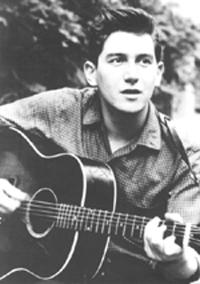
Phil Ochs a 19 anni. 19 yo Phil Ochs.
28/29 gennaio 2008
Integrazione di una strofa il 14 maggio 2020
La traduzione è svolta sulla poesia originale completa; anche qui le parti corrispondenti al canto di Loreena McKennitt sono indicate in corsivo.
IL BANDITO DI STRADA
Prima parte
Il vento, un torrente di buio tra gli alberi squassati,
La luna, un galeone spettrale sbattuto su mari di nubi
La strada, un nastro di chiardiluna sulla brughiera purpurea
E il bandito di strada a cavallo,
In testa un tricorno piumato, merletti fioriti sul mento,
Un manto di velluto scarlatto, calzoni di daino bruno
Portati senza neanche una piega; stivali alti alla coscia!
E cavalcava in uno scintillìo come di gioielli,
Sui ciottoli scalpitava nel buio cortile della locanda,
E bussò col suo frustino agli scuri, ma tutto era chiuso e tangato;
Fischiò un'aria alla finestra, e chi vi stava a aspettare
Se non la figlia occhineri del padrone,
Cigolò nel buio la porta di una stalla nella vecchia locanda
Dove Tim, lo stalliere, ascoltava col volto pallido e languente;
Con gli occhi scavati di follia, i capelli come paglia ammuffiata,
Ma lui amava la figlia del padrone,
"Un bacio, mia dolce amata, sto seguendo una preda stanotte,
Ma sarò di ritorno con l'oro lucente prima della luce del mattino;
Ma se m'incalzeranno dappresso, e mi tormenteranno durante il giorno,
Allora cercami al chiardiluna,
Si alzò dritto sulle staffe; le arrivava appena alla mano
Ma lei sciolse i capelli alla finestra! E la faccia gli si incendiò
Quando la nera cascata di profumo precipitò sul suo petto;
E baciò i capelli ondulati nel chiardiluna,
Seconda parte
Non venne all'albeggiare; non venne a mezzogiorno;
Né dopo rosso tramonto, prima del sorgere della luna,
Quando la strada era un nastro gitano annodato alla brughiera purpurea
Una truppa dalla giubba rossa giunse marciando--
Non dissero parola all'oste; bevvero invece la sua birra.
Imbavagliarono sua figlia, e la legarono ai piedi del letto stretto.
Due di loro si sporsero alla sua finestra, con moschetti al loro fianco!
Vi era morte a ogni finestra;
La legarono sull'attenti, con molti gesti maliziosi.
Posero un moschetto vicino a lei, con la canna sul suo petto!
"Adesso, fai buona guardia!" e la baciarono. Lei udì il morto dire--
Cercami nel chiardiluna,
Lei torse le mani dietro di se; ma tutti i nodi erano saldi!
Torse le mani finché le sue dita furono madide di sudore o sangue!
Si tesero e sforzarono nell'oscurità, e le ore si trascinavano come anni,
Finché, allo scoccare della mezzanotte,
Lo toccò la punta di un dito; non si sforzò oltre!
Si alzò all'erta in piedi, la canna sotto al seno.
Nessun rischio di poter esser sentita, nessuno sforzo ancora,
Perché la strada stava là, spoglia nel chiardiluna,
Tlot-tlot! Avevano sentito? Gli zoccoli del cavallo suonavano chiari;
Tlot-tlot, in lontananza! Erano sordi a non sentire?
Lungo il nastro di luna, oltre il ciglio della collina,
Il bandito venne a cavallo -
Tlot, nel gelido silenzio; Tlot, nella notte echeggiante!
Più vicino divenne e più vicino ancora. Il volto di lei era come una luce
Gli occhi crebbero un istante; prese un ultimo profondo respiro,
Poi le sue dita si mossero nel chiardiluna,
Egli si volse. Spronò verso ovest, non sapeva chi giaceva
Chinata, con la testa sopra il moschetto, intrisa del suo stesso sangue!
Non lo sentì sino all'alba, e la sua faccia divenne grigia a sentire
Come Bess, la figlia dell'oste,
E indietro, spronò come un pazzo, urlando una maledizione al cielo,
Con la bianca strada fumante dietro di lui e il suo stocco brandito alto.
Rosso sangue erano i suoi speroni nel mezzogiorno dorato; rosso vino la sua giacca di velluto;
Quando gli spararono sulla strada maestra,
E ancora dicon che una notte d'inverno quando il vento squassa gli alberi,
Quando la luna è un galeone spettrale sbattuto su mari di nubi,
Quando la strada è un nastro di chiardiluna sulla brughiera purpurea
Dicon che un bandito di strada a cavallo,
Sui ciottoli scalpita nel buio cortile della locanda,
E bussa col suo frustino agli scuri, ma tutto è chiuso e tangato;
Fischia un'aria alla finestra, e chi vi sta a aspettare
Se non la figlia occhineri del padrone,
Prima parte
Il vento, un torrente di buio tra gli alberi squassati,
La luna, un galeone spettrale sbattuto su mari di nubi
La strada, un nastro di chiardiluna sulla brughiera purpurea
E il bandito di strada a cavallo,
a cavallo, a cavallo
Il bandito di strada a cavallo fino alla porta della vecchia locanda.In testa un tricorno piumato, merletti fioriti sul mento,
Un manto di velluto scarlatto, calzoni di daino bruno
Portati senza neanche una piega; stivali alti alla coscia!
E cavalcava in uno scintillìo come di gioielli,
scintillavano i calci delle pistole,
E balenava l'elsa dello stocco sotto il cielo baluginante.Sui ciottoli scalpitava nel buio cortile della locanda,
E bussò col suo frustino agli scuri, ma tutto era chiuso e tangato;
Fischiò un'aria alla finestra, e chi vi stava a aspettare
Se non la figlia occhineri del padrone,
Bess, la figlia del padrone,
Che intrecciava un vermiglio nodo d'amore nei suoi lunghi capelli neri.Cigolò nel buio la porta di una stalla nella vecchia locanda
Dove Tim, lo stalliere, ascoltava col volto pallido e languente;
Con gli occhi scavati di follia, i capelli come paglia ammuffiata,
Ma lui amava la figlia del padrone,
Bess, la figlia del padrone dalle labbra rosse,
E muto come un cane ascoltava, e udì dire questo al bandito:"Un bacio, mia dolce amata, sto seguendo una preda stanotte,
Ma sarò di ritorno con l'oro lucente prima della luce del mattino;
Ma se m'incalzeranno dappresso, e mi tormenteranno durante il giorno,
Allora cercami al chiardiluna,
Veglia su di me al chiardiluna,
Verrò da te al chiardiluna, anche se l'inferno mi sbarrasse la strada."Si alzò dritto sulle staffe; le arrivava appena alla mano
Ma lei sciolse i capelli alla finestra! E la faccia gli si incendiò
Quando la nera cascata di profumo precipitò sul suo petto;
E baciò i capelli ondulati nel chiardiluna,
(Oh, dolci onde nel chiardiluna!)
Poi strattonò le redini nel chiardiluna, e galoppò lontano a occidente.Seconda parte
Non venne all'albeggiare; non venne a mezzogiorno;
Né dopo rosso tramonto, prima del sorgere della luna,
Quando la strada era un nastro gitano annodato alla brughiera purpurea
Una truppa dalla giubba rossa giunse marciando--
Marciando, marciando--
Gli uomini del re Giorgio vennero marciando alla porta della vecchia locanda.Non dissero parola all'oste; bevvero invece la sua birra.
Imbavagliarono sua figlia, e la legarono ai piedi del letto stretto.
Due di loro si sporsero alla sua finestra, con moschetti al loro fianco!
Vi era morte a ogni finestra;
L'inferno a una scura finestra;
Perché Bess vedeva, attraverso il telaio, la strada che lui avrebbe cavalcato.La legarono sull'attenti, con molti gesti maliziosi.
Posero un moschetto vicino a lei, con la canna sul suo petto!
"Adesso, fai buona guardia!" e la baciarono. Lei udì il morto dire--
Cercami nel chiardiluna,
Veglia su di me nel chiardiluna,
Verrò da te nel chiardiluna, anche se l'inferno mi sbarrasse la strada!Lei torse le mani dietro di se; ma tutti i nodi erano saldi!
Torse le mani finché le sue dita furono madide di sudore o sangue!
Si tesero e sforzarono nell'oscurità, e le ore si trascinavano come anni,
Finché, allo scoccare della mezzanotte,
Freddo, allo scoccare della mezzanotte,
La punta di un dito lo toccò! Il grilletto alla fine era suo!Lo toccò la punta di un dito; non si sforzò oltre!
Si alzò all'erta in piedi, la canna sotto al seno.
Nessun rischio di poter esser sentita, nessuno sforzo ancora,
Perché la strada stava là, spoglia nel chiardiluna,
Spoglia e vuota nel chiardiluna;
E nel chiardiluna il palpito delle sue vene scandiva il suo amore. Tlot-tlot! Avevano sentito? Gli zoccoli del cavallo suonavano chiari;
Tlot-tlot, in lontananza! Erano sordi a non sentire?
Lungo il nastro di luna, oltre il ciglio della collina,
Il bandito venne a cavallo -
Cavalcando, cavalcando
Le giubbe rosse guardarono alle loro armi! Lei si alzò, dritta e silenziosa.Tlot, nel gelido silenzio; Tlot, nella notte echeggiante!
Più vicino divenne e più vicino ancora. Il volto di lei era come una luce
Gli occhi crebbero un istante; prese un ultimo profondo respiro,
Poi le sue dita si mossero nel chiardiluna,
Il moschetto infranse il chiardiluna,
Infranse il suo petto nel chiardiluna e lo avvertì con la sua morte.Egli si volse. Spronò verso ovest, non sapeva chi giaceva
Chinata, con la testa sopra il moschetto, intrisa del suo stesso sangue!
Non lo sentì sino all'alba, e la sua faccia divenne grigia a sentire
Come Bess, la figlia dell'oste,
La figlia occhineri dell'oste,
Aveva vegliato per il suo amore nel chiardiluna, e là era morta nell'oscurità.E indietro, spronò come un pazzo, urlando una maledizione al cielo,
Con la bianca strada fumante dietro di lui e il suo stocco brandito alto.
Rosso sangue erano i suoi speroni nel mezzogiorno dorato; rosso vino la sua giacca di velluto;
Quando gli spararono sulla strada maestra,
Lo abbatterono come un cane sulla strada maestra,
E giacque nel suo sangue sulla strada maestra, coi merletti fioriti alla gola.E ancora dicon che una notte d'inverno quando il vento squassa gli alberi,
Quando la luna è un galeone spettrale sbattuto su mari di nubi,
Quando la strada è un nastro di chiardiluna sulla brughiera purpurea
Dicon che un bandito di strada a cavallo,
a cavallo, a cavallo
Che un bandito di strada arrivi a cavallo fino alla porta della vecchia locanda.Sui ciottoli scalpita nel buio cortile della locanda,
E bussa col suo frustino agli scuri, ma tutto è chiuso e tangato;
Fischia un'aria alla finestra, e chi vi sta a aspettare
Se non la figlia occhineri del padrone,
Bess, la figlia del padrone,
Che intreccia un vermiglio nodo d'amore nei suoi lunghi capelli neri.
Meravigliosa non la conoscevo sinche',mia figlia non me ne parlo'.Stanno studiando a scuola questa poesia e mi ha raccontato di essere rimasta incantata dalla canzone .L'ho trovata su youtube e' veramente commovente.
jenny - 12/3/2014 - 19:13
Mannaggia la pupazza! C'era già!
Siccome ho passato la mattinata a comporre una pagina per questa canzone, almeno contribuisco quella che sarebbe stata l'introduzione... hai visto mai che ci sia qualche info aggiuntiva.
Siccome ho passato la mattinata a comporre una pagina per questa canzone, almeno contribuisco quella che sarebbe stata l'introduzione... hai visto mai che ci sia qualche info aggiuntiva.
[1906]
Versi pubblicati sul semestrale scozzese “Blackwood's Magazine”, poi nella raccolta “Forty Singing Seamen and Other Poems” pubblicata l’anno seguente
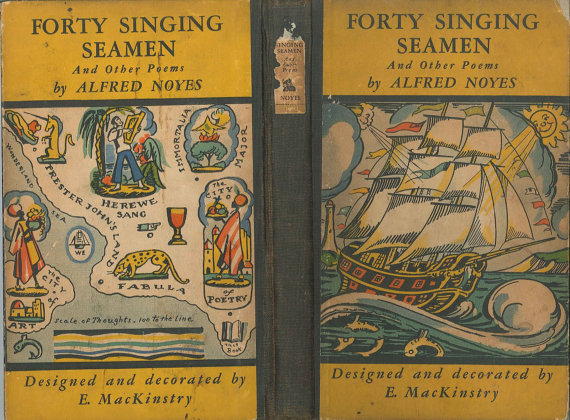
Molti artisti hanno messo in musica questa lunga poesia, anche in adattamenti e riduzioni. Fra di loro i compositori Deems Taylor (nel 1914) e C. Armstrong Gibbs (nel 1933) ma più recentemente questi versi di Noyes hanno interessato persino Phil Ochs (nel suo album I Ain't Marching Anymore del 1966, con una versione abbastanza fedele), Stevie Nicks dei Fleetwood Mac (nel suo album solista “Bella Donna” del 1981), Loreena McKennitt (nel 1997) ed Andy Irvine (nel 2000)
Un affascinante ed innominato bandito nell’Inghilterra del 700 (all’epoca di Giorgio I o II - l’ambientazione fu ispirata a Noyes passando per la foresta di Swinley, tra Surrey e Berkshire) è innamorato – corrisposto – della bella Bess, giovane figlia di un grosso proprietario terriero. Va a farle visita nottetempo ma viene notato da uno stalliere, brutto ed invidioso, che informa i soldati.
Questi arrivano alla proprietà e sequestrano e violentano Bess e poi la prendono in ostaggio, ben legata, in attesa che il suo amato si faccia vivo, per ucciderlo. Quando l’highwayman giunge, la sua amata lo salva dall’imboscata riuscendo a far partire uno sparo dal moschetto di un soldato, ma il colpo la uccide. Il bandito potrebbe scappare ma, cieco di rabbia, si getta sui soldati e muore anch’egli, fucilato sulla strada. I fantasmi dei due amanti continueranno a incontrarsi per sempre nelle più fredde e tempestose notti d’inverno...
Versi pubblicati sul semestrale scozzese “Blackwood's Magazine”, poi nella raccolta “Forty Singing Seamen and Other Poems” pubblicata l’anno seguente

Molti artisti hanno messo in musica questa lunga poesia, anche in adattamenti e riduzioni. Fra di loro i compositori Deems Taylor (nel 1914) e C. Armstrong Gibbs (nel 1933) ma più recentemente questi versi di Noyes hanno interessato persino Phil Ochs (nel suo album I Ain't Marching Anymore del 1966, con una versione abbastanza fedele), Stevie Nicks dei Fleetwood Mac (nel suo album solista “Bella Donna” del 1981), Loreena McKennitt (nel 1997) ed Andy Irvine (nel 2000)
Un affascinante ed innominato bandito nell’Inghilterra del 700 (all’epoca di Giorgio I o II - l’ambientazione fu ispirata a Noyes passando per la foresta di Swinley, tra Surrey e Berkshire) è innamorato – corrisposto – della bella Bess, giovane figlia di un grosso proprietario terriero. Va a farle visita nottetempo ma viene notato da uno stalliere, brutto ed invidioso, che informa i soldati.
Questi arrivano alla proprietà e sequestrano e violentano Bess e poi la prendono in ostaggio, ben legata, in attesa che il suo amato si faccia vivo, per ucciderlo. Quando l’highwayman giunge, la sua amata lo salva dall’imboscata riuscendo a far partire uno sparo dal moschetto di un soldato, ma il colpo la uccide. Il bandito potrebbe scappare ma, cieco di rabbia, si getta sui soldati e muore anch’egli, fucilato sulla strada. I fantasmi dei due amanti continueranno a incontrarsi per sempre nelle più fredde e tempestose notti d’inverno...
B.B. - 4/12/2017 - 13:06
Volendo essere pignoli, non è corretto dire che le strofe non cantate da Loreena McKennitt siano quelle in corsivo, in quanto lei conclude la canzone con quella che è la penultima strofa, anche se in verità essa ricalca quasi completamente la prima. Omette solo l'ultima che a sua volta è la ripetizione della terza, con una sola variazione del tempo dei verbi bussare e fischiare. E' curioso invece il fatto che tutti omettano la responsabilità dello stalliere spione Tim.
Flavio Poltronieri - 23/1/2018 - 20:51
@RICCARDO VENTURI
manca la traduzione della strofa
[The tip of one finger touched it;
she strove no more for the rest!
Up, she stood up to attention,
with the barrel beneath her breast,
She would not risk their hearing;
she would not strive again;
For the road lay bare in the moonlight;
Blank and bare in the moonlight;
And the blood of her veins in the moonlight throbbed to her love's refrain.]
insonne in attesa
manca la traduzione della strofa
[The tip of one finger touched it;
she strove no more for the rest!
Up, she stood up to attention,
with the barrel beneath her breast,
She would not risk their hearing;
she would not strive again;
For the road lay bare in the moonlight;
Blank and bare in the moonlight;
And the blood of her veins in the moonlight throbbed to her love's refrain.]
insonne in attesa
Cattia Salto - 14/5/2020 - 18:10
@ Cattia Salto
Eccomi qua e mi metto subito al lavoro....scusandomi per la semi-scomparsa dovuta a motivi non propriamente piacevoli...
Eccomi qua e mi metto subito al lavoro....scusandomi per la semi-scomparsa dovuta a motivi non propriamente piacevoli...
Riccardo Venturi - 14/5/2020 - 19:52
@ Cattia Salto
Ecco, ho tradotto la strofa mancante e l'ho integrata nel testo. Per sicurezza te la trascrivo anche qui sotto:
Certo, una mia cosa davvero tipica: dimenticarmi una strofa. Ai tempi delle Child Ballads con i quaderni e la macchina per scrivere non so quante volte ho dovuto rifare fogli già pronti perché mi ero dimenticato delle strofe. La maledizione si ripete.
Ecco, ho tradotto la strofa mancante e l'ho integrata nel testo. Per sicurezza te la trascrivo anche qui sotto:
Lo toccò la punta di un dito; non si sforzò oltre!
Si alzò all'erta in piedi, la canna sotto al seno.
Nessun rischio di poter esser sentita, nessuno sforzo ancora,
Perché la strada stava là, spoglia nel chiardiluna,
Si alzò all'erta in piedi, la canna sotto al seno.
Nessun rischio di poter esser sentita, nessuno sforzo ancora,
Perché la strada stava là, spoglia nel chiardiluna,
Spoglia e vuota nel chiardiluna;
E nel chiardiluna il palpito delle sue vene scandiva il suo amore.Certo, una mia cosa davvero tipica: dimenticarmi una strofa. Ai tempi delle Child Ballads con i quaderni e la macchina per scrivere non so quante volte ho dovuto rifare fogli già pronti perché mi ero dimenticato delle strofe. La maledizione si ripete.
Riccardo Venturi - 14/5/2020 - 22:12
@Riccardo Venturi
Grazie, una traduzione letterale ma che mantiene la forza espressiva dell'originale
Grazie, una traduzione letterale ma che mantiene la forza espressiva dell'originale
Cattia Salto - 15/5/2020 - 09:19
×
![]()







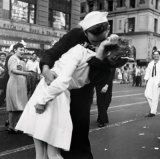
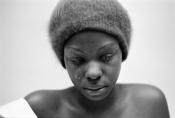
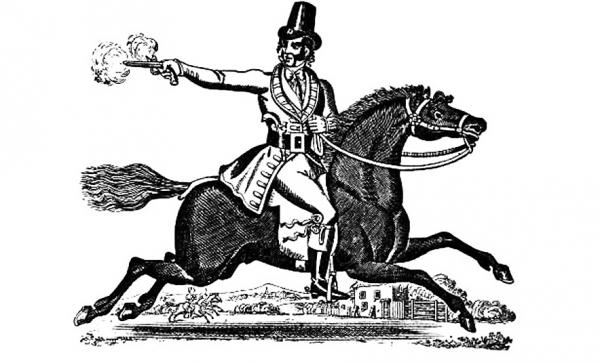
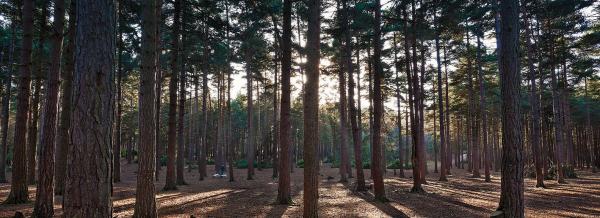
1965
A poem [1906] by Alfred Noyes (1880-1958)
Poesia di A poem [1907] by Alfred Noyes (1880-1958)
Musica / Music: Phil Ochs
Album: I Ain't Marching Anymore [1965]
b) Loreena McKennitt's Version / Versione di Loreena McKennitt
1993
A poem [1906] by Alfred Noyes (1880-1958)
Poesia di A poem [1907] by Alfred Noyes (1880-1958)
Musica / Music: Loreena McKennitt
Album: The Book of Secrets [1997]
"The Highwayman is a narrative poem by Alfred Noyes, published in 1906. The poem was written when Noyes was a young man, and brought him immediate and long-lasting success. It tells the story of a nameless highwayman who is in love with an innkeeper's beautiful daughter named Bess. Tim, the insanely jealous hostler (stableman) betrays the highwayman to the authorities; an action which paves the way for the brutal death of the lovers." - en.wikipedia
In entrambe le circostanze non si tratta di un caso, e forse al di là di quelle che furono le primitive intenzioni del poeta. Alfred Noyes, che era un religiosissimo conservatore, scrisse, come è peraltro logico, semplicemente una storia, e una storia non dissimile da quella di molte altre ballate popolari e di autore in cui si applica la perfetta definizione di Giacomo Leopardi: Fratelli a un tempo stesso amore e morte / ingenerò la sorte. Ma ogni testo va poi per conto proprio; arriva un giorno a Phil Ochs, che può vedervi una storia dove la sopraffazione del potere armato (gli scherani del Re Giorgio) e il tradimento hanno tragicamente la meglio sul ribelle e sull'amore; e la storia del Bandito di Strada e di Bess, la figlia del locandiere, ha, mutatis omnibus mutandis, qualche analogia con quella di Iris e Silvio. Da qui la sua "funzionalità" in un album antimilitarista al massimo grado come I Ain't Marching Anymore, senza contare l'allora in corso Ballad Revival. Poi un giorno arriva a Loreena McKennitt, in preda a un dolore enorme (che la tenne lontana dalla canzone per nove anni), che poté vedervi semplicemente la storia di un amore terminato in tragedia, ma comunque di un amore senza fine. Perché questa è la caratteristica delle parole che si fanno poesia: ciascuno può vedervi ciò che vuole, a seconda della propria sensibilità e della propria vita. La poesia è una forma estrema di libertà, che se la prende e sa darla.
Ora, proprio per questo, The Highwayman è arrivata a chi scrive. Il quale la conosceva, e la conosceva bene, da anni e anni, in entrambe le sue versioni. Però in questi giorni gli è arrivata di nuovo, e per un motivo del tutto personale. La voglia di farne il simbolo di qualcosa che, nei suoi desideri, vorrebbe non finisse mai (possibilmente evitando le cruente modalità della poesia/canzone, va da sé!); e la voglia di dedicarla alla persona non "oggetto", ché il termine "oggetto" è di per sé orrendo e sbagliato, ma protagonista di questo desiderio. Ed è quello che vado a fare, con convinzione e -soprattutto- con amore; questa pagina speciale è per una persona speciale, è per lei. Tá réalta i mo chroí. [RV]
Notice/Avvertenza. Both Phil Ochs and Loreena McKennitt sing the song omitting some verses. The verses omitted in Loreena's version are shown in italics; the 4th verse of Part One is omitted in both versions.
Sia Phil Ochs che Loreena McKennitt cantano la canzone omettendo alcune strofe. Le strofe omesse nella versione di Loreena sono indicate in corsivo; la 4a strofa della Prima Parte è omessa in entrambe le versioni.